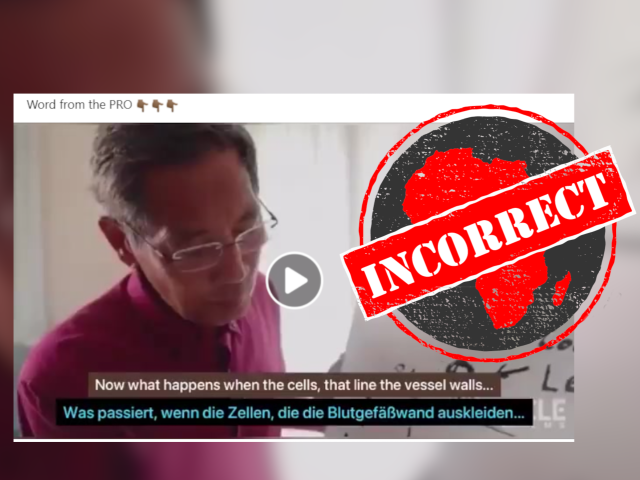It has been over 18 months of fact-checking misinformation related to Covid-19 in Kenya, the bulk of which has been about the virus’s origin, transmission, treatment and cure. Vaccines have also not been spared.
The main platforms for false information have included Facebook, Twitter, YouTube and Instagram.
However, as the infodemic – an avalanche of too much information – persisted, we realised that focusing on open platforms was leaving out closed ones that were just as influential, such as messaging service WhatsApp. We dived deeper into this, and shared useful lessons from our experiences. We further came up with effective strategies to fight misinformation on social media.
But we have also explored other innovative approaches to fight false information in society:
-
We have tried using digital media influencers to share engaging factual content.
-
We deployed fact ambassadors to share accurate information in their WhatsApp groups and networks.
-
We have also used radio theatre in Senegal and Nigeria to educate people about the dangers of health misinformation – including debunking harmful myths.
As we deployed all these strategies, we realised there was a missing link: offline rural communities in Kenya. These are people without smartphones or internet connections who depend on community radio stations for their news.
With the support of DW Akademie and European Union funding we came together to campaign for reliable information. We conducted over 40 media literacy shows with different community radio stations in different parts of the country, and offered bespoke fact-checking and verification training to nearly 100 community radio journalists.
What did we learn? Three key things proved useful in helping interrupt the cycle of Covid-19 misinformation and to stem the tide of anti-vaccine rhetoric among less connected communities in Kenya.
1. Unverified information gets on air and is amplified as part of call-in shows
In a live show on one of the radio stations, a caller told the presenter that since receiving the Covid-19 vaccine she had been “unable to do anything”.
“It has been weeks,” she said, “but I just feel tired. It is like the vaccine took my energy away.”
Unfortunately, the presenter used that anecdote to solicit more comments from the audience.
“We have heard that the vaccine makes you weak and that it takes away your energy. What else are you people experiencing? Talk to me,” she said.
It took the intervention of one caller to explain that fatigue is a side effect of the vaccine, and that according to the World Health Organization (WHO), this should subside after a few days.
This second caller further pushed for accurate information.
“People should stop saying ‘I heard that the vaccine does this or that’. If they have a question, let them ask a doctor. Sometimes, what you hear are just rumours concocted out here and passed around as fact,” he said.
The useful lesson in that episode was that we needed to train radio journalists and presenters to be aware of the different ways in which false information travels, and to make them disrupt its flow through their platforms.
It may be in a presenter's toolbox to sensationalise information to keep their audience engaged. Still, if they must do that, they should err on the side of facts and not help give wings to misinformation. Doing so could put lives in danger.
2. People want to hear from experts in a language they understand
While we were doing the media literacy campaign on community radios, the editors told us that they had previously hosted experts to speak about Covid-19 and vaccine misinformation, but the expertise was inaccessible to their listeners because of language.
So we specifically focused on doing the interviews in Kiswahili. In one instance, we appeared on Sky FM, which broadcasts in the Luo language, and the presenters helped translate the content live on air.
When some of the listeners called in, it was really satisfying to hear their illuminating questions, useful anecdotes and helpful feedback about just how much they had learned, and what they needed more information about.
They also asked direct questions on specific rumours regarding vaccine efficacy, safety and side-effects – questions which fact-checkers had already debunked. It was a joy amplifying that accurate information.
After the radio show, many understood why it was safer to take a vaccine, maintain social distance, wear a well-fitting mask, and wash hands frequently.
3. We are fact-checkers, not experts
“Is it safe to take the vaccine if I have arthritis and high blood pressure?” one caller asked us.
The short answer is: “Yes, but you will need to present yourself to a health facility and explain your condition to a health worker. They are the ones to determine whether the vaccine will be safe for you”.
WHO experts recommend that people with pre-existing conditions receive Covid-19 vaccines. But, where possible, they should get the jab only after a medical worker has assessed the stability of their condition.
“Those who should consult with a doctor before vaccination include people with a compromised immune system, older people with severe frailty, people with a history of severe allergic reaction to vaccines, people living with HIV, and those who are pregnant or breastfeeding,” the WHO notes.
It is the job of a fact-checker to amplify what the experts say, and not to claim to be an expert. We should always make this clear to our audience and cite our sources transparently, to allow the listeners to vet the information themselves and to build trust about the quality of our content.
The job is to educate listeners on what they should do to detect health misinformation, how they can verify that information, and where they can get credible health information. It is to let them know that whenever they hear a claim, they must ask for proof, vet the evidence, and ask health experts – doctors or nurses – to fill in information gaps.





Add new comment